In the eye of the storm: Lipscomb alumni draw on leadership skills to navigate Helene recovery in Tennessee
College of Leadership & Public Service equips students with strategies to lead during times of crisis
Kim Chaudoin |
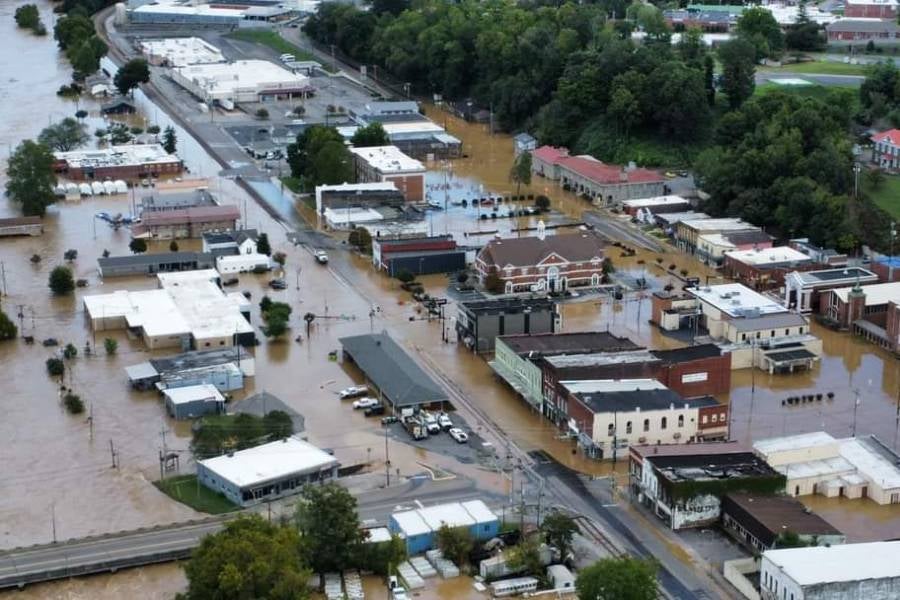
Downtown Newport in Cocke County was flooded when three nearby rivers overflowed in the aftermath of Hurricane Helene. Photo courtesy: Rob Mathis
One year ago, Hurricane Helene carved a path of destruction through the southeastern United States, leaving behind a story of devastation … and resilience.
Though Tennessee is far from the coast, the Category 4 storm’s reach extended deep into the Appalachian region, where torrential rains, flash flooding and infrastructure collapse devastated towns across the eastern part of the state.
In the face of this unprecedented disaster, five recent graduates from Lipscomb University’s College of Leadership & Public Service (CLPS) stepped into the breach. While working full time, they pursued their graduate studies in Lipscomb’s Master of Arts in leadership and public service program — a one-year degree intentionally designed for working professionals. Armed with the leadership skills, ethical grounding and collaborative mindset they developed through this program, these public servants became anchors of hope in their communities. Their stories offer a powerful testament to the transformative impact of a Lipscomb University education.
“Leadership isn’t just about stepping up in a crisis. It’s about being prepared to serve with integrity, empathy and bold action,” says Steve Joiner, dean of Lipscomb’s College of Leadership & Public Service. “Their work during Hurricane Helene’s aftermath has been nothing short of extraordinary. These alumni exemplify what it means to lead with heart and purpose.”
Helene’s Impact on Tennessee
Helene made landfall in Florida’s Big Bend region on Sept. 26, 2024. As it surged inland, Tennessee’s eastern counties were pummeled by up to three feet of rain, 60 mph winds, and catastrophic flooding, triggering massive mudslides in some areas. The Nolichucky River became a violent torrent, sweeping away homes, bridges and entire communities. Seventeen Tennesseans lost their lives.
Infrastructure crumbled. Five state bridges were destroyed, 22 roadway sections rendered impassable, and the Kinser Bridge in Greene County—traversed by over 10,000 vehicles daily—was washed away. A portion of Interstate 40 collapsed, and countless residential and commercial buildings were reduced to rubble. Railroads, hospitals, water systems, and power grids were crippled.
Lawmakers estimated that Tennesseans faced more than $1.2 billion in damage-related costs. According to the state Department of Agriculture, losses to agricultural and forestland alone ranged from $547 million to $1.8 billion. The economic toll—felt across tourism, manufacturing, and local economies—will be felt for years to come.
How Lipscomb prepares leaders for crisis
Lipscomb’s College of Leadership & Public Service is the place “Where Tennessee Turns for Leadership.” Through a model built on civil discourse, innovation and bold action, the college equips students to lead in times of uncertainty, says Joiner. Programs like the Regional Scholars initiative ensure that leaders from rural and underserved communities have access to advanced education and to bring those skills back home.
“Our mission is to prepare leaders who can navigate complexity, build consensus and act decisively,” says Joiner. “Hurricane Helene tested those skills in real time—and our alumni rose to meet that challenge.”
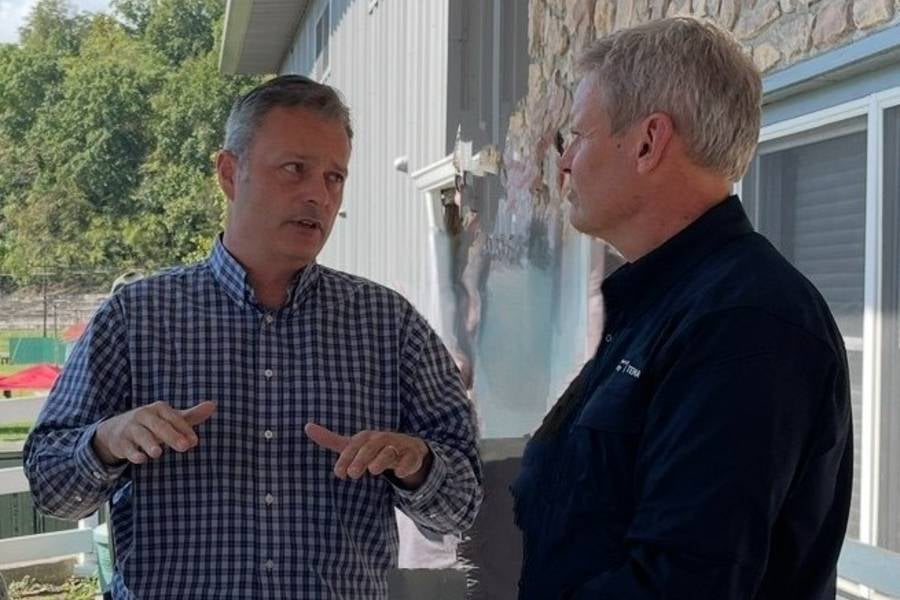
Rob Mathis (’24), left, meets with Tennessee Governor Bill Lee who toured Cocke County in the days following the catastrophic flooding. Photo courtesy: Rob Mathis
A mayor who refused to let his county fall
Rob Mathis (’24) had been mayor of Cocke County, nestled in the Smoky Mountain region of east Tennessee, for just two years when Helene hit. All three major rivers in the county — the Pigeon, French Broad and Nolichucky — achieved record flood stage simultaneously, flooding the city of Newport.
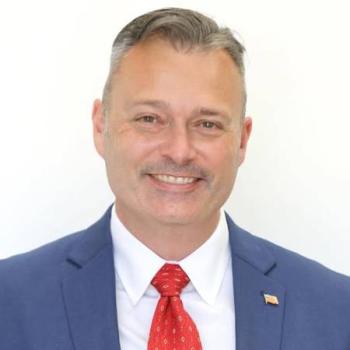
Rob Mathis
The county jail, road department, mayor’s office, election commission, veterans’ service office, planning department, chancery court and archives were all “wiped out in a day.” In addition, a portion of I-40 collapsed; many roads, businesses and over 300 homes were either destroyed or severely damaged; and two residents lost their lives in the flooding.
“Fires, blizzards and localized flooding are things we have always considered as possible threats,” says Mathis, a native of Cocke County. “Hurricanes, however, were not something we thought remotely possible.”
However, Mathis and his team stayed watchful as the rain began to fall on Sept. 26. As water began to rise, Mathis made the decision to close county offices the next day out of an abundance of caution. Cocke County employees moved their technology out of harm’s way in case water from a nearby river seeped into the office basement. But by mid-morning the next day, it was obvious that this was going to be a flood like which had never hit the area before.
As county mayor, Mathis was responsible for organizing and leading Cocke County’s response, recovery and rebuilding efforts, which he describes as unfolding in four major phases. The initial life-saving stage involved conducting rescues and pushing emergency services to their limits as the risk to life peaked in the disaster’s first days. This was followed by the life-sustaining phase, where the primary challenge was providing food, clothing, shelter and other necessities to residents while essential services like water, electricity and stores were disrupted—keeping the hospital open until water utilities were restored was especially critical. The cleanup phase, which has taken months and is still ongoing, focused on removing storm debris from land and waterways, a process made smoother by significant state assistance. Finally, the rebuilding phase is expected to span four to five years. “This will likely be a grueling marathon. Securing funds to repair $160 million in infrastructure damage is a difficult task,” he explains. “We will accomplish this, however, because failure is not an option.”
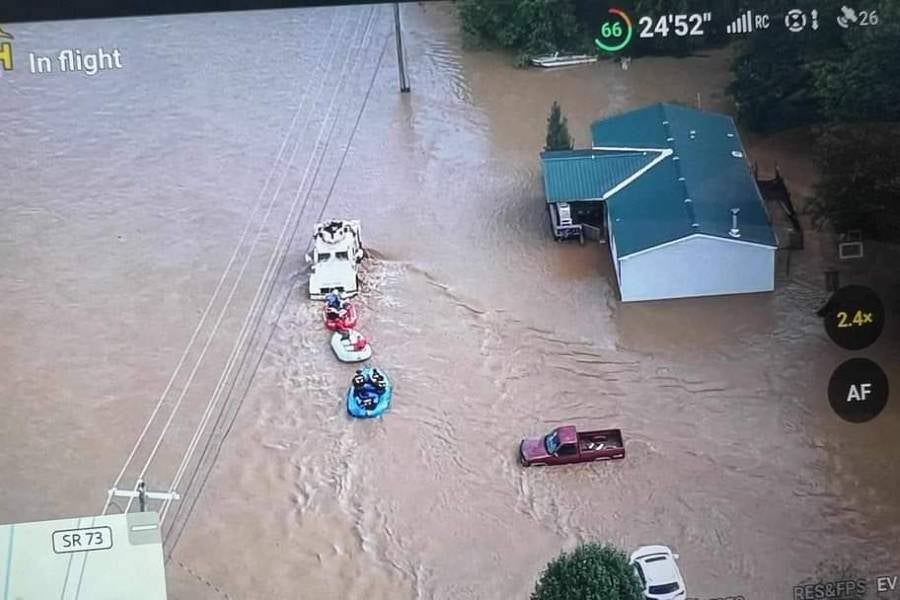
Many residents in Newport had to be rescued from their homes by boat as flood waters rose. Photo courtesy: Rob Mathis
Mathis reflects that communication and effective problem-solving were key in managing the response to Helene. “Throughout this event and its aftermath, we have stressed the importance of unity, cooperation, positivity, resilience and strength,” he says.
He also drew upon his experience in Lipscomb’s College of Leadership & Public Service.
“Leadership and personal development have always been important to me. This program presented an opportunity to hone these skills and to enhance my ability to lead our community as mayor,” shares Mathis. “It also helped expand our connections and network. Alec Richardson, an August 2025 leadership and public service graduate and former senior advisor and director of external affairs for Tennessee Gov. Bill Lee, has been a great help to our county throughout this event. We are in his debt.”
“The lessons in consensus building and organizational communications were very helpful,” continues Mathis. “Encouraging 40,000 people while fending off rumors and fake news was a challenge. These Lipscomb classes helped our team to maintain clarity and effective communications while also enabling us to listen to the public in order to assess needs and develop courses of action.”
As he reflects on the recovery efforts of the last year and what lies ahead, Mathis says, “Our goal is to make each day a little better than the past.”
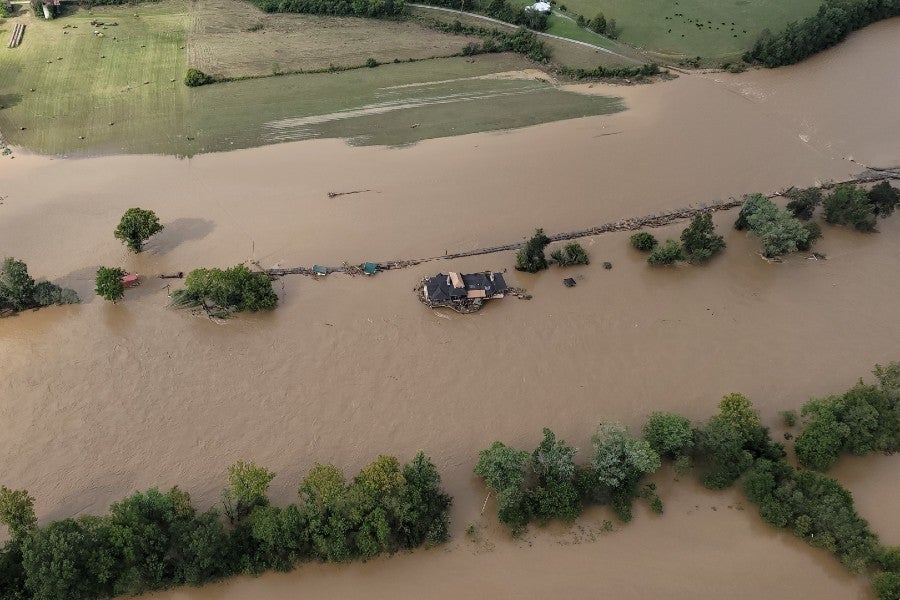
Flooded farmland in Cocke County. Photo courtesy: Rob Mathis
A young leader on the front lines
At just 22 years old, Derek Driskill, an August 2025 graduate, was stationed in Cocke County as a rural fellow for the Tennessee Department of Economic and Community Development when Helene struck.
“I remember watching the water levels rise and realizing we were about to lose entire neighborhoods,” Driskill says. “It was surreal - and terrifying.”
“Having grown up in Cocke County, I never imagined a hurricane could cause damage this far inland. The flooding we experienced was unprecedented, reaching heights that are almost unfathomable,” he reflects. “I know there are a lot of images online of the flooding in East Tennessee. However, pictures truly cannot do justice to the level of water that ran through our county.”

Derek Driskill
Driskill worked tirelessly alongside local leaders in the days following the storm, managing with limited sleep or working late into the night. In his role, he focused primarily on the recovery efforts, helping establish a local relief fund through Cocke County Partnership to secure emergency grants and handle the generous monetary donations that began to roll in from around the world. He also spent time in the county’s EOC where he sat in on regular debriefs alongside Mathis, the EMA director, TEMA and FEMA representatives, highway patrol, and a host of other organizations, leaders and volunteers.
“Cocke County was blessed to be led by Mayor Rob Mathis, and his steady leadership provided hope for us during the most crucial times of the crisis and continues to do so during the long road of recovery,” says Driskill.
Some of the immediate challenges Driskill encountered as the situation unfolded was responding to the mass volume of texts, calls and emails coming into the EOC while also responding to emergency rescues and crucial, time-sensitive decisions.
Driskill notes that he drew upon the program’s emphasis on adaptive leadership and systems thinking strategies learned as a student in the College of Leadership & Public Service to navigate this situation. “Being able to step back, assess complex situations and lead with empathy were all skills reinforced through the program that have proven vital throughout this recovery journey,” he says. “My classmates and professors were also a valuable support network during this time, and I cannot overstate my appreciation for their love and constant support.”
“I leaned heavily on the principle of servant leadership, and I simply tried to put the needs of the community first and lead by example. Transparency, empathy and consistent communication were key pillars of my approach throughout,” shares Driskill. “Being the youngest person in the room is never easy, so I felt that being authentic, being willing to listen and being willing to do anything that was needed was how I could best serve my community.”
“This experience reaffirmed that leadership isn’t about having all the answers,” concludes Driskill. “Instead, it is about being present, building trust, and fostering resilience. I’m grateful for the knowledge, training, and community that Lipscomb has provided me. It truly has made a real difference.”
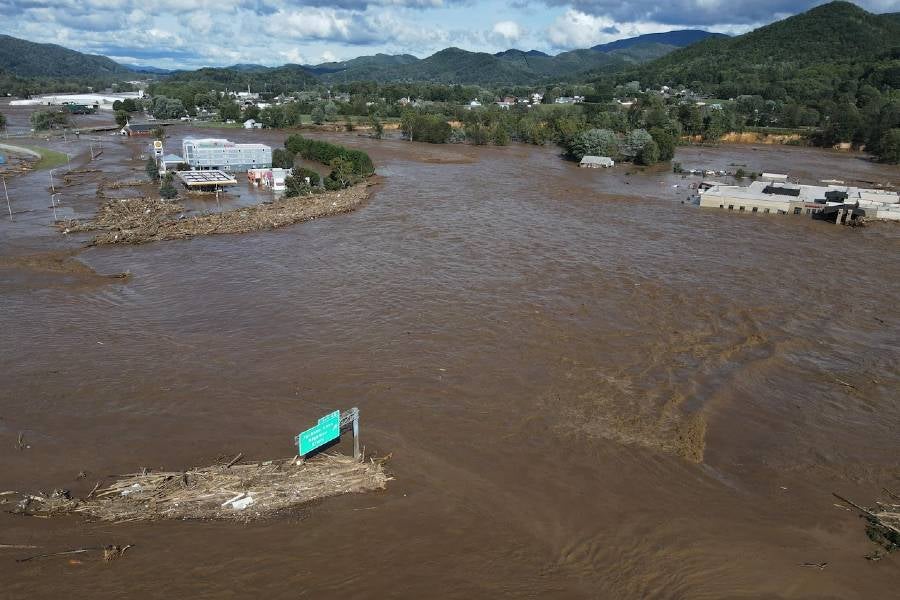
Floodwaters surround Unicoi County Hospital in Erwin, Tennessee. Photo courtesy: Andrew Harris
The rescuer who never quit
Andrew Harris (’25), captain of Unicoi County Search and Rescue, an all-volunteer team that responds to emergencies and disasters, had trained for worst-case scenarios. But nothing prepared him for the scale of devastation Hurricane Helene unleashed.

Andrew Harris
“We’ve prepared for flooding, winter storms and tornadoes,” he says. “But the hurricane’s aftermath reaching this deep inland was extremely unprecedented.”
A lifelong resident of Unicoi, a small, tight-knit mountain community in East Tennessee, Harris helped coordinate local search, rescue and recovery operations.
“That meant organizing rescue missions, prioritizing resources, supporting mutual aid with other organizations, and making sure our team stayed safe and focused under extreme stress,” he explains. “I also served as a liaison with emergency management and helped communicate updates to the public.”
Harris led a team of volunteers through treacherous terrain, round the clock. Homes were destroyed, roads collapsed and the Unicoi County Hospital in Erwin was engulfed in 12-foot high floodwaters which stranded more than 50 patients and staff on its roof. The rescue and recovery operations took a physical toll on the team, but also an emotional one as they witnessed unfathomable devastation around them.
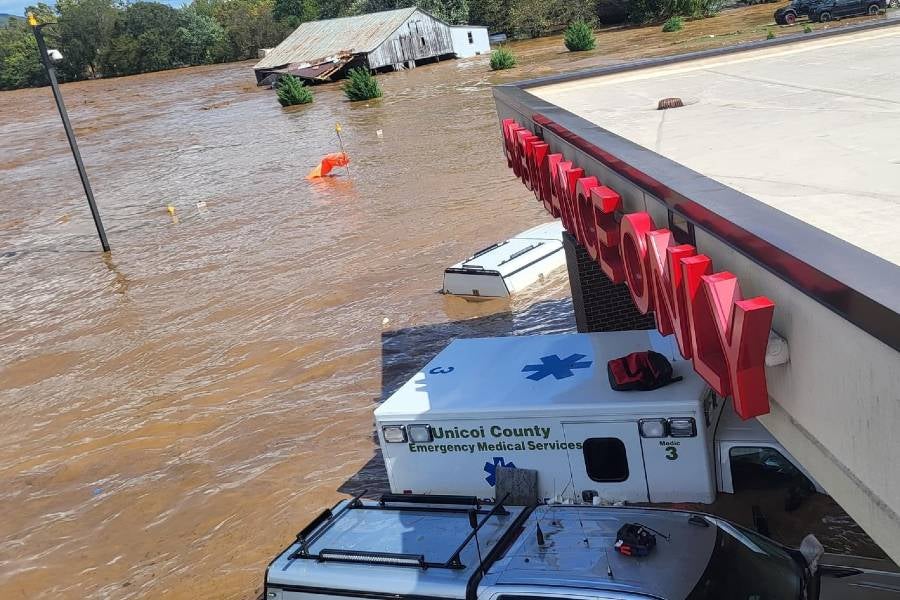
Over 50 patients and staff were stranded on the roof of Unicoi County Hospital and had to be rescued by helicopter. The building, which was inundated with as much as 12 feet of water, was deemed beyond repair. Photo courtesy: Andrew Harris
“One of the hardest parts was balancing the urgency of the moment with the emotional toll it took on our team. We were rescuing neighbors, friends, even family members,” shares Harris. “Resources were limited, communication lines went down and many roads were impassable. Yet in the middle of that chaos, we had to stay grounded and make split-second decisions that impacted lives.”
The impact of the most catastrophic event to hit Unicoi County will be felt for years to come.
“Hurricane Helene left scars across our region that are still healing. Torrential rains caused landslides, flash flooding and road washouts. Homes and livelihoods were lost overnight. Our rescue team worked around the clock evacuating residents, locating missing persons, and coordinating with neighboring counties. The storm took a toll on both the land and the people, but it also showed how deeply we care for one another.”
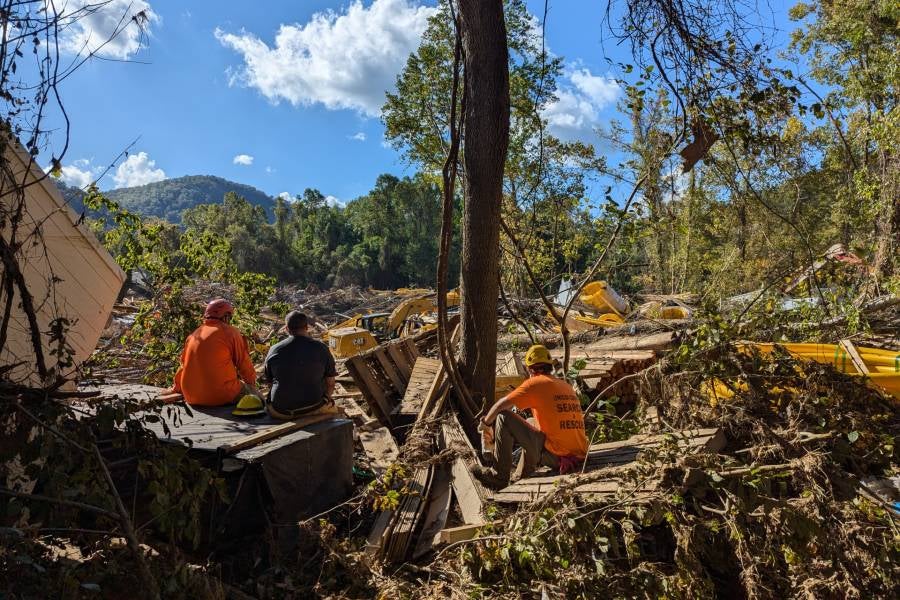
Search and rescue team members sit among the debris left in the aftermath of Helene. Photo courtesy: Andrew Harris

Major thoroughfares and roads succumbed to mudslides caused by the immense flooding. Photo courtesy: Andrew Harris
Harris’s leadership philosophy — with servant leadership at the core — and strategies learned in his graduate studies at Lipscomb shaped how he guided his team — and kept him focused on the task at hand. He says he believes leadership is more than just showing up in a crisis, “it’s about showing up with wisdom, compassion and a vision for rebuilding stronger.” That is why he was drawn to the College of Leadership & Public Service — because of its focus on ethical leadership, intentional relationships and public service that resonated with his calling to serve, especially in rural and underserved communities.
Harris explains the program helped him lead with courage and clarity and equipped him with the tools to “think strategically, act ethically and inspire others through a shared purpose.”
“Lipscomb’s emphasis on adaptive leadership and collaborative problem-solving helped immensely,” he explains. “The program doesn’t just teach theory, it prepares you to lead through uncertainty. I leaned heavily on what I’d learned about cross-sector coordination and community engagement. Those lessons helped me stay level-headed and responsive in the most challenging moments. I don’t just want to react to crises—I want to build systems and partnerships that improve outcomes in the future. Lipscomb has helped shape that vision.”

Supplies are brought in by helicopter to the Appalachian Christian Camp, located in Unicoi. Photo courtesy: Aaron Morris
A community leader who offered shelter
Over at Unicoi County’s Appalachian Christian Camp, executive director and Harris’s CLPS classmate Aaron Morris (’25), transformed his facility into a haven for displaced families and relief workers. Located just minutes from catastrophic damage, the camp canceled fall retreats and opened its 220 beds to those in need.
“We received very little storm damage on our property, but we were very close to some of the worst-impacted areas. The Appalachian Christian Camp staff knew people would be out of their homes and others would want to come in from other parts of the country to help, and there would be a limit to where people could stay,” he explains. “Our leadership met and made the decision to cancel all retreats booked for the remainder of the fall so we could offer as much help as possible.”
They opened up spaces for displaced families to move into that they would not have to share. With the limited spaces filling up quickly, they started seeking campers to bring in to be able to offer more housing. The camp also opened dorms to groups of relief workers who came from across the country to help in the hardest hit areas.
Over 700 relief workers from 19 states and 10 families from both Tennessee and North Carolina stayed at the camp from October through December. Morris and his team managed the housing, coordinated meals, kept the facilities clean and brought in volunteers to serve as cooks, chaplains and security. Eventually, they also helped families find their next step in housing.
“We were very blessed financially by so many who helped support this effort,” says Morris, who lives in Johnson City. “Thanks to donors, we were able to do all this without any guest needing to pay for their room or meals.”
Appalachian Christian Camp closed its relief efforts at the end of 2024 to prepare for summer camp. Although the camp did not sustain damage, the impact of the flood was still close at hand for the staff.
“The floodwaters from the storm did incredible damage throughout that area. Many lives, homes, and businesses were lost. The people of this community will feel this hurt for decades,” says Morris. “There are many of God's blessings to celebrate, but this will be a long process for all involved.”
Throughout this time, Morris says faculty and administrators in the leadership and public service program were supportive and caring, as were the members of his cohort, including Harris.
“Andrew worked tirelessly in the rescue efforts. I have known Andrew for a very long time,” shares Morris. “I can't say enough how proud I am of him and his fortitude and strength during this.”
Morris first became familiar with Lipscomb’s program when he was encouraged by a graduate of the program, for whom he had great respect, encouraged him to check it out. As one who tries to be a continual learner, especially in the area of leadership, Morris says he was inspired by what he was told about the program. And he credits the program for helping him navigate this challenging time with confidence.
“It has been such a solid reminder that we need to always be honing our leadership skills. Most of us called to be leaders don't have to do so in crisis, but the more we learn from programs like this, the more ready we are when crisis comes,” he says. “And, again I feel incredibly supported by my cohort and leaders of this program.”
But Morris says the credit should not go to him.
“First, we could not do what we did without God's guidance. Second would be community. Leading is about those around you who do what needs to be done. It has so very little to do with the one with the title of leader,” he shares. “The camp staff, our volunteers, and the camp community that supported us, came through huge. I have experienced this community over the past twenty-five years, but to see them rally like this was amazing.”
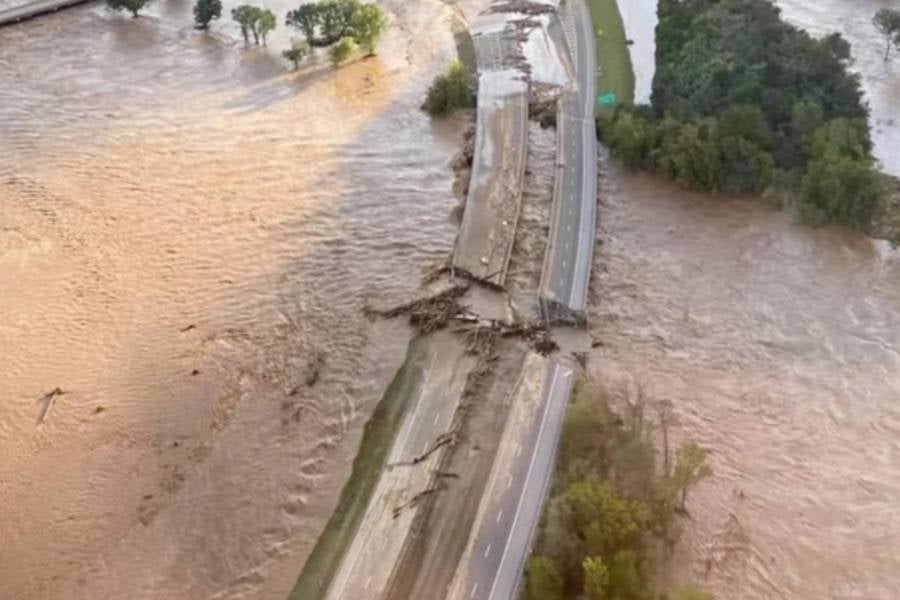
I-26 in Erwin, Tennessee on Sept. 27, 2024. Photo courtesy: Tim Bailey
The administrator who kept the town running
As town recorder for Erwin, Tim Bailey (’24) oversees the day-to-day operations of local government and ensures that the town functions smoothly and effectively across all departments. He manages a team of 55 employees distributed across eight departments, including public works, parks and recreation, police, fire, zoning and codes, communications, finance and administration, and central staff. Another core responsibility is financial stewardship, including infrastructure planning and improvements. A significant part of his role is ensuring that all employees are not only safe in their work environment, but also supported in their efforts to serve the community.
Then, Helene hit.
“I never thought a disaster of this size would ever impact us here in Erwin, Tennessee. In my 20-plus years of training and experience in disaster response, I always assumed I’d be called to help a community near the coast—somewhere where hurricanes and tropical storms are more common,” Bailey reflects. “Tennessee is a landlocked state, and Erwin has always felt protected, with a calm river running nearby and mountains surrounding us. It never crossed my mind that a tropical storm would reach this far inland, let alone cause the kind of damage we experienced with Helene. When it did, everything changed.”
“Suddenly, I wasn’t responding as an outsider coming in to help—I was responding as a member of the very community that needed support,” he continues. “It was personal. I was helping my neighbors, my friends, and my town. That shift brought a different kind of urgency and responsibility to the work. It wasn’t just about recovery—it was about protecting the people and the place I care most deeply about.”
During and after Hurricane Helene, Bailey’s role evolved into a cornerstone of Erwin’s emergency response and recovery efforts. Typically responsible for maintaining municipal records and overseeing financial operations, Bailey quickly became a central figure in coordinating Erwin’s compliance with local, state and federal disaster protocols. Immediately after the storm, he began compiling detailed documentation of damages, expenses and recovery activities—critical groundwork for securing FEMA reimbursement and other federal aid. As recovery funds began to flow in, Bailey shifted into a stewardship role, tracking and managing incoming dollars with an emphasis on transparency and accountability. He collaborated closely with department heads to prioritize projects based on community needs, while also maintaining the continuity of government operations—from payroll and procurement to legal recordkeeping. Behind the scenes, he served as an administrative hub for emergency services, public works, and planning, facilitating communication with FEMA and the Tennessee Emergency Management Agency.
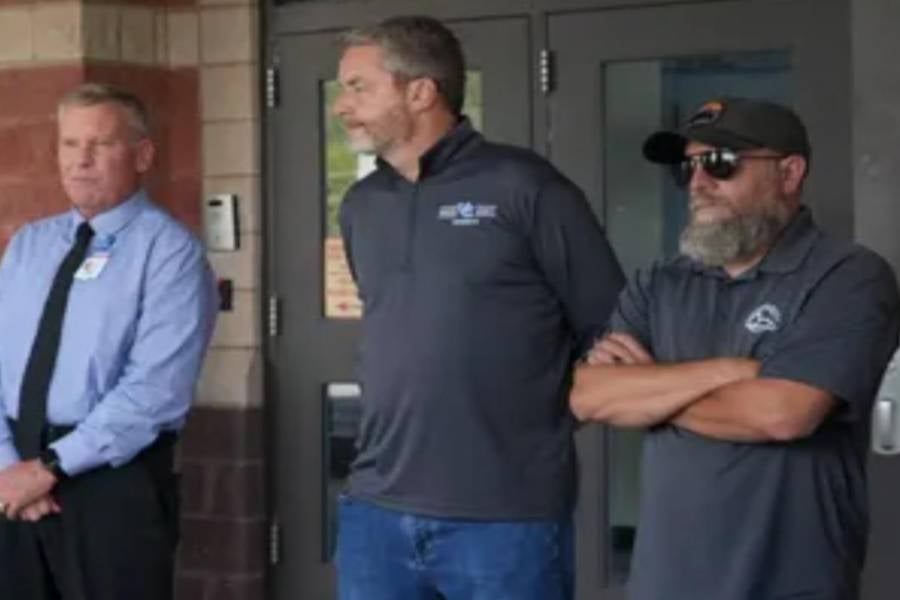
From left to right, Erwin Mayor Glenn White, Superintendent of Schools John English, and Town Recorder Tim Bailey at a Press Conference on Tropical Storm Helene. Photo courtesy: Tim Bailey
Bailey found himself at the center of a storm response that tested every facet of leadership, logistics, and emotional resilience. With roads and bridges destroyed, the hospital submerged, and communication systems down, coordinating emergency access and restoring infrastructure became a race against time. Bailey and other local leaders had to respond swiftly, even as grief and trauma rippled through the town. With federal aid delayed, the burden of response fell on local government and volunteers, forcing Bailey to stretch limited resources—shelter, clean water, food—while maintaining transparency and equity in their distribution. Rebuilding trust was a priority, especially for vulnerable populations at risk of being overlooked.
For Bailey, one of the most demanding aspects of Erwin’s recovery from Hurricane Helene was the constant tension between immediate crisis response and long-term planning. Each day brought new emergencies—damaged infrastructure, displaced residents, urgent funding needs—yet Bailey had to keep one eye on the future, anticipating what the town would require months or even years down the line. That dual focus demanded not only logistical precision but also emotional endurance, as he worked to rebuild not just what was lost, but to lay the foundation for a stronger, more resilient Erwin.
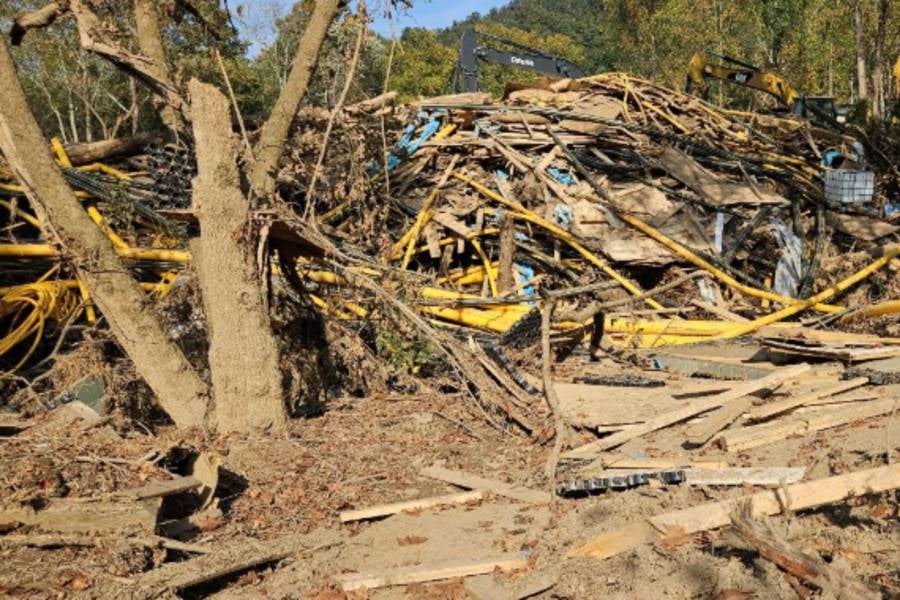
A debris pile left by Tropical Storm Helene near South Industrial Drive in Erwin, Tennessee. Photo courtesy: Tim Bailey
Amid the devastation, Bailey witnessed the depth of Erwin’s spirit. “Despite the heartbreak and hardship, I saw compassion, unity, and determination in every corner of our community,” he says. Grounded in the principles of servant leadership and collaborative governance, Bailey leaned on years of experience in crisis communication and strategies learned during his graduate leadership studies at Lipscomb to guide his work. “My goal is to serve with integrity, to lead with purpose, and to always keep the well-being of our community at the center of every decision,” he shares.
Bailey chose to pursue a graduate degree in leadership because he wanted to become a transformative leader who could make a lasting impact in his community. “Lipscomb’s program stood out to me because it blends practical leadership training with a strong ethical foundation rooted in service, which aligns with my personal values and professional goals,” he says. “Simply put, I chose Lipscomb because I wanted to grow into the kind of leader who brings people together, builds trust, and drives real, meaningful change. And that’s exactly what the program helped me become.”
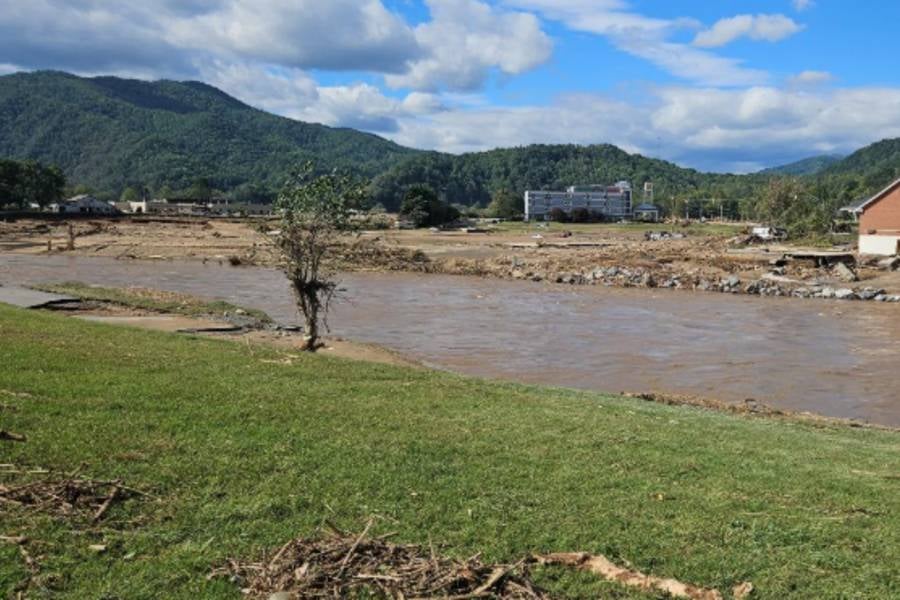
Riverview Church along the Nolichucky River in Erwin, Tennessee. Photo courtesy: Tim Bailey
Bailey credits Lipscomb’s leadership and public service program with equipping him to navigate both the immediate crisis and long-term recovery efforts following Tropical Storm Helene. “The program gave me not only the mindset and skills to navigate a crisis of this magnitude,” Bailey says, “but also a support network I could lean on during the most trying moments of my career.”
Among the most influential lessons, he shares, was the concept of adaptive leadership—learning to distinguish between technical problems, such as damaged infrastructure, and adaptive challenges like rebuilding trust and morale. “That distinction became critical in the aftermath of the storm,” he says. “We faced both physical destruction and emotional trauma—challenges that couldn’t be solved with a simple checklist.” Bailey also leaned heavily on principles of collaborative governance and ethical leadership, drawing on Lipscomb’s emphasis on cross-sector coordination and transparent communication.
“We don’t recover in silos,” he says. “True leadership means knowing how to bring people together.” That approach helped him mobilize volunteers, coordinate with agencies like FEMA and TEMA, and maintain public trust through honest, empathetic dialogue with residents. Servant leadership, another cornerstone of the program, shaped Bailey’s presence in the community. “It wasn’t about position or title,” he says. “It was about presence and purpose.” Even now, as recovery continues, Bailey said the lessons from Lipscomb remain central to his work. “The LPS program didn’t just teach me how to lead in theory—it shaped who I am in practice.”
Reflecting on the experience of serving his community during this catastrophic disaster, Bailey says the storm tested him in ways few moments had, but it also reaffirmed his commitment to public service.
“This was one of the most difficult chapters in my life, but also one of the most meaningful. Despite all that’s been taken from us, I believe in our community’s strength. We are resilient. We are resourceful. And we are determined,” he reflects. “Through hard work, strong leadership, and critical federal support, we will recover—not just return to where we were, but emerge stronger, more prepared, and more connected than ever before. The road ahead won’t be easy, but we’re walking it together—and that makes all the difference.”
The long recovery
One year after Hurricane Helene, Tennessee’s recovery is far from over. Communities are healing, rebuilding and preparing for a more resilient future.
“These stories reflect the heart of our mission,” concludes Dean Steve Joiner. “To prepare leaders who don’t just respond—they transform. In the face of disaster, our alumni showed what it means to lead with courage, conviction and care.”
Learn more about Lipscomb’s College of Leadership & Public Service.
Building the structure against disasters
Monica Sartain, assistant Civil Engineering professor at Lipscomb University, shares how engineering begins with preparing for disaster and how Lipscomb's program brings together the professional skills with the mission mindset as we pass the one-year mark after Hurricane Helene's destruction